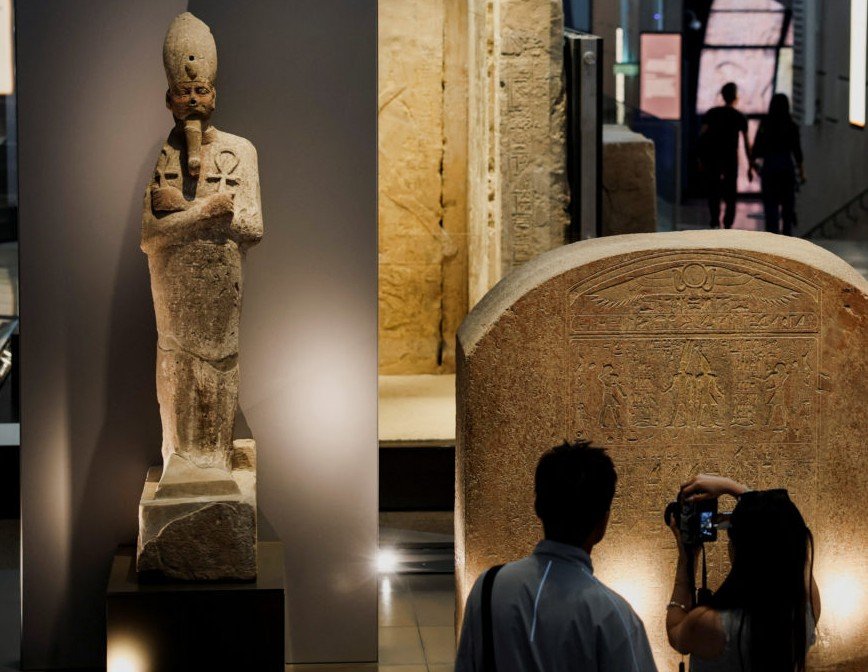Egyptian lawmaker Freddy Elbaiady has called for an immediate overhaul of the Grand Egyptian Museum’s ticketing system, claiming it discriminates against locals by placing them in a secondary category. The controversy erupted after the newly opened museum in Cairo confirmed a quota that allocates tickets separately for Egyptians and foreigners, sparking widespread backlash online and in parliament.
Backlash Over Quota System
The Grand Egyptian Museum, known as GEM, introduced a pre-booking ticketing system on November 16, 2025, to manage visitor flow and ensure safety. This move came amid reports that the museum sold 27,000 tickets in a single day, exceeding its planned limit of 20,000.
Critics argue the quota favors foreigners, limiting Egyptian access to their own cultural heritage. Social media posts from users in Egypt highlight frustration, with many saying locals face sold-out slots while foreigner tickets remain available.
Recent data shows the museum aims to balance visits, but the ratio can reach up to 60 percent for one group and 40 percent for the other. This has led to claims of chaos at entry points, where some visitors with tickets were turned away due to overbooking.

Lawmaker’s Strong Push for Change
Freddy Elbaiady, a member of parliament and vice president of the Egyptian Social Democratic Party, submitted a formal request on November 16, 2025, to abolish the quota entirely. He stated that no country should tell its citizens their share of access to national treasures is finished.
In public statements, Elbaiady emphasized that while higher prices for foreigners are common worldwide, restricting locals through quotas is unacceptable. He vowed to keep pressing until the system changes in a transparent way.
His actions follow online speculation and have gained support from other politicians and the public. Elbaiady’s Facebook post on the issue drew thousands of views, amplifying the debate.
This is not the first time Egyptian officials have faced criticism over cultural access. Similar issues arose in 2024 with event ticketing at historical sites, where locals felt sidelined.
Museum’s Official Response
GEM chief executive Ahmed Ghoneim addressed the concerns on November 22, 2025, confirming the quota but assuring it would not exceed balanced limits. He explained the system helps manage crowds and provides a better experience for all visitors.
The museum plans to make online booking the only method starting December 1, 2025. Officials say this will reduce congestion and improve safety at the site near the Giza pyramids.
Despite these assurances, the museum has not yet responded directly to Elbaiady’s request. Ghoneim noted that Egyptians still make up the majority of visitors, based on recent attendance figures.
To highlight the ticketing details, here is a quick comparison:
| Category | Adult Ticket Price (EGP) | Student Ticket Price (EGP) |
|---|---|---|
| Egyptians | 200 | 100 |
| Foreigners/Arabs | 1,450 | 725 |
This table shows the price differences, which some see as fair, but the quota adds to the tension.
Public Sentiment and Online Reactions
Social media platforms buzz with opinions on the issue. Users on X, formerly Twitter, have shared stories of locals unable to book tickets, while foreigners secure spots easily.
Key points from public reactions include:
- Demands for equal access to Egypt’s heritage without quotas.
- Support for higher foreigner fees but opposition to limited local slots.
- Calls for better crowd management without discrimination.
One viral post described chaos at the museum gates, where guides suggested banning locals on weekends to prioritize tourists. This fueled debates about tourism revenue versus national pride.
Surveys from local news outlets in November 2025 show over 70 percent of Egyptians polled want the quota removed. The controversy ties into broader discussions on how Egypt balances tourism income with citizen rights.
Historical Context of the Museum
The GEM project began in 1992 under former president Hosni Mubarak to replace the overcrowded Egyptian Museum in Tahrir Square. After delays, it opened in October 2025, housing artifacts like Tutankhamun’s treasures.
Run as a public-private partnership, the museum involves the Ministry of Tourism and Antiquities and private firm Hassan Allam. Its location near the pyramids draws global visitors, boosting Egypt’s economy.
Recent events, such as the museum welcoming over 100,000 visitors in its first month, underline its popularity. Yet, the ticketing row risks overshadowing these achievements.
Experts note that similar quota systems exist in other countries, like timed entries at the Louvre, but Egypt’s approach has sparked unique cultural sensitivities.
Potential Impacts and Next Steps
If the quota persists, it could lead to more parliamentary debates or even policy changes in Egypt’s tourism sector. Analysts predict increased scrutiny on how cultural sites handle local versus international visitors.
On the positive side, resolving the issue might enhance the museum’s reputation and encourage more domestic tourism. With Egypt’s economy relying on tourism, which generated over 12 billion dollars in 2024, finding a fair system is crucial.
As this story develops, readers should watch for updates from parliament and the museum. Share your thoughts in the comments below, and spread the word if you think equal access matters.
